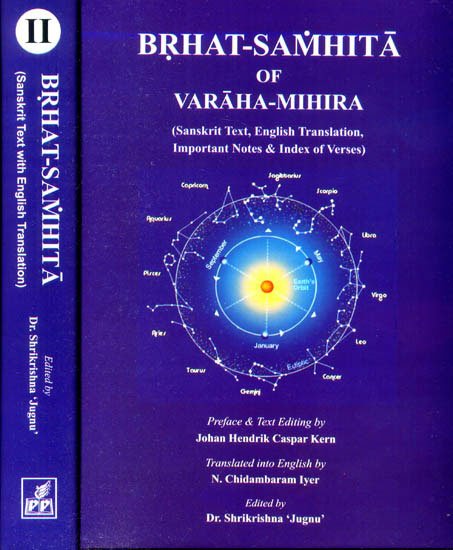Brihat Samhita
by N. Chidambaram Iyer | 1884 | 135,584 words | ISBN-13: 9788171104215
This page describes on the cry of the jackal (shiva-ruta) which is the ninetieth Chapter of the English translation of the Brihat-samhita. This work, written by Varahamihira in the 6th century, is classified as jyotisha literature, also known as Indian astronomy. It contains however, also content regarding astrology, palmistry, agriculture, gardening, perfumes, medicines and various other encyclopedic topics.
Chapter 90 - Omens (5): On the cry of the Jackal (śivā-ruta)
[Sanskrit text for this chapter is available]
1. All that has been said of the dog applies also to the jackal (śivā). There are however a few special points to be noticed. The jackal becomes ruttish in the Śiśira season when its acts signify nothing. If the jackal be seen to cry hū-hū first and ṭā-ṭā next, the cry is benefic. All other cries are malefic.
2. Kakka is the natural cry of the jackal known as Lomāśika; it indicates good luck. All other cries indicate evil.
3. The cry of the jackal in the east and in the north indicates good luck; if the cry be towards a Śānta (benefic) quarter, the person will be respected everywhere. If the cry be towards the Dhūmita quarter and be malefic in its nature, the lords of such quarter will suffer miseries.
4. In whatsoever quarter the jackal (śivā) may be, if its cry be towards a Dīpta (malefic) quarter, there will be prosperity. The cry at noon indicates great evil; the cry of the jackal in the south and towards the Sun indicates misery to the town and army.
5. If yāhī be the cry of the jackal, there will be injury from fire. If ṭāṭeti be the cry, there will be death. If dhig-dhig be the cry, wicked deeds will be committed; if the cry be that of the jackal (śivā) with a flaming mouth, the country will meet with ruin.
6. According to some, the cry of the jackal of the flaming mouth does not indicate evil. The mouth of the jackal appears bright as the Sun or fire owing to its water.
7. If a jackal (śivā) facing the south be seen to cry in answer to the cry of another jackal, there will be death by hanging. If it be found to do so facing the west, there will be death by drowning.
8. If from one to seven jackals be seen to cry together, there will respectively be freedom from cares, the receipt of good intelligence, gain of wealth, gain of an object of desire, cares of the mind, misery to the chief person and the gain of a carriage.
9. If eight, nine or more jackals be seen to cry together, such cry signifies nothing. If the group be found to cry in the south, just the reverse of the effects excepting the 5th and 6th will occur.
10. If the cry of the jackal be found to fill man with a thrill of fear and to cause the horse to pass urine and dung, there will be miseries.
11. The cry of the jackal which stops at the sound of man. the elephant or the horse indicates prosperity to the town and to the army.
12. If bhebhe be the cry of the jackal (śivā), there will be fear. If the cry be bho-bho, there will be danger; if it be phiphe, there will be death or imprisonment and if hūhū be the cry, there will be prosperity.
13. If a benefic jackal (śivā) while crying a-au should hear another cry as ṭāṭā and begin to cry so in response or if it be found to cry beginning with the sound ṭe-ṭe and ending with the-the, such cries signify nothing except that the animal is in rut.
14. If the cry of a jackal be at first found to be loud and disagreeable and again as in response to the cry of another jackal, there will be prosperity, gain of wealth and the return of a friend from his travels.
